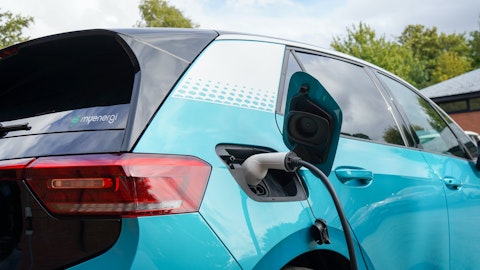Nicolas Brunet: Hey Kevin, Nick here. To answer your question there, yes, the purchase orders on vast minority were at a fixed price. We have, for sure, seen some inflation in the billet materials over the last year or 18 months, and that’s reflected in the gross margins that we’re presenting today. We continue to think that the model scales really well. So the way to protect is obviously to start with a unit level economics that works well, and we think that’s the case. That said, you’ve heard us in the previous quarters talk about some price increases that we rolled out. They are relatively modest price increases, and we’re going to gradually start seeing those through the P&L. And because of our direct sales model, we feel that we’re quite nimble in being able to implement those price increases.
But the bottom line, it’s really starting with a unit level economic that works well and that scales well and we think that’s the case today still with the figures in the order book.
Kevin Chiang: I know you’re not going to give me the number because I know someone tried to ask it earlier, but maybe just from a qualitative perspective then, do you think the inflation you’ve seen over the past couple of years here, and maybe some of this is transient over time, but whatever is structural, do you think that materially changed where you thought the breakeven unit number was versus what you — today versus maybe what you thought a couple of years ago or has inflation been pretty manageable, and that breakeven target is still pretty much the same?
Nicolas Brunet: Yes. For sure, it has an impact. But I’d say scale and unit mix will have — are more important than just the inflationary pressure. And as I mentioned, going forward, when we think longer term, the price adjustments will sort of reset that. Recall that we’ve always said that our objective is to bring the price to our customers down over time. For sure, inflation takes us in a different direction in the very short term. The objective remains that in the longer term. What it does cause certainly a delay in price reductions for us.
Marc Bedard: Kevin, also keep in mind that the batteries that we’re using right now, like the BMW batteries, I mean we had a fixed rate. And we have 4,700 of those in stock as we speak. So this has an impact of about — the batteries account for, let’s say, 30% to 40% of the billet material of an EV. So this is very significant and also, we’re very pleased by the investments that we’ve made in the battery factory. The battery factory, I mean, this is going to make such a huge difference in terms of costing. I mean, at some point because obviously, we’re shaving cost. I mean, when we’re comparing to the others. So we spoke earlier about all the advantages of adding our own battery factory in terms of cooling technology and all of that and better efficiency in all of this, but also better costing, and this makes a huge difference.
And this is something we’re totally controlling through this vertical integration. So right now, I mean, for 2023, it’s going to be mostly the BMW batteries that we will be using and this cost has not really changed. So that’s a big piece of our billet material, and this is something that really helped us manage through this inflation.
Kevin Chiang: Those are great points. And thank you very much. And best of luck in 2023 here. Thank you.
Marc Bedard: Thank you.
Operator: The next question comes from Dan Levy with Barclays. Please go ahead Dan.




